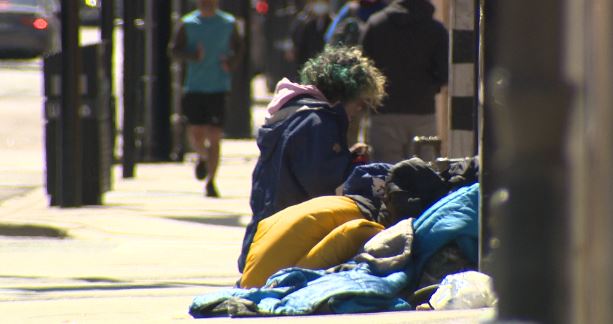In Saskatoon — the province’s COVID-19 epicentre — a variety of people are turning to the city’s homeless hub for help, including many who are new to the system.

“People who normally wouldn’t be seen as rough sleepers, or sleeping on the street, are now in that circumstance because of COVID-19,” said Colleen Christopherson-Cote, member of the COVID-19 Community Response Team.
This includes families with small children, seniors and women.
The hub has been open for two weeks, but already 30 people have been turned away as they showed symptoms of COVID-19.
To address the issue, the province opened a testing site for those who are being turned away.
However, hundreds of people still need help, says Christopherson-Cote, as the province’s housing strategy continues to fail many in Saskatoon where there are 147 cases of COVID-19.
On March 31, the government of Saskatchewan announced they would house the homeless in hotels or open up their stock of 2,000 empty units within the Saskatchewan Housing Corporation (SHC) to organizations.
Since then, the hub has received access to 10 hotel rooms and 10 units within the SHA.
“We feel in the community that there’s some positive movements from the announcements within the provincial government. However, the actual implementation on the ground is not being mobilized,” said Christopherson-Cote.
The 40 front-line organizations that form the hub say they are constantly running into red tape.

Get weekly health news
“The strategy isn’t operational,” Christopherson-Cote said.
They haven’t been able to move anyone into the 10 housing units because of red-tape around furniture.
“Most of the SHC units are unfurnished, so people can’t move in.”
The other piece is that social supports are not in place.
“Folks that we’re trying to house have complex medical and mental health needs,” said Christopherson-Cote. “And so we need to ensure that the services and supports for them are wrapped around them so that they stay isolated in these places and we don’t create further harm to them.”
As for hotels, the 10 rooms are only for those who have tested positive for COVID-19. The point of entry for access to these rooms is through the testing site.
“The idea that 10 units in hotels is enough to support folks is problematic,” said Christopherson-Cote. To date, three people have accessed the rooms as the hub deals with additional red-tape.
“There’s problems surrounding preparedness, making sure hotels are receiving people who have PPE, cleaning supplies, and that public health initiatives are up and running.”
Homeless people can also access rooms through the Cold Weather Strategy, but it’s a short-term solution.
“If someone shows up and needs to be isolated and hasn’t been tested and qualifies for the hotel night stay, they get a 24-hour stay, but then they’re back on the street or back to the testing site the next day,” Christopherson-Cote said.
The hub says the process has been frustrating as these issues were flagged prior to the province’s announcement on March 31.
“Having a blanket policy for a population that is extremely complex, it creates barriers for us to be able to access,” Christopherson-Cote said.
The Ministry of Social Services told Global News in a statement that they’re continuing to work with community partners, emergency shelters and the Saskatchewan Red Cross to ensure they’re all supported.
“If there are individuals who require more support, we would ask that emergency shelters connect with the Ministry so we can follow-up,” said the statement.
The government of Saskatchewan was unable to provide the number of hotels and SHC units that have become available to organizations.
Questions about COVID-19? Here are some things you need to know:
Health officials caution against all international travel. All international travellers returning to Saskatchewan are required to self-isolate for 14 days in case they develop symptoms and to prevent spreading the virus to others.
Symptoms can include fever, cough and difficulty breathing — very similar to a cold or flu. Some people can develop a more severe illness. People most at risk of this include older adults and people with severe chronic medical conditions like heart, lung or kidney disease. If you develop symptoms, contact public health authorities.
To prevent the virus from spreading, experts recommend frequent handwashing and coughing into your sleeve. They also recommend minimizing contact with others, staying home as much as possible and maintaining a distance of two metres from other people if you go out.
For full COVID-19 coverage from Global News, click here.
















Comments